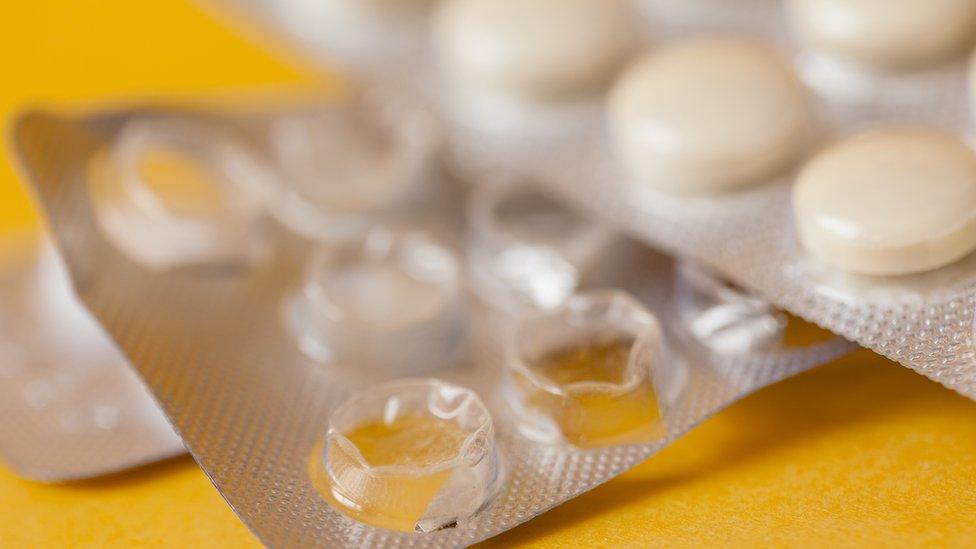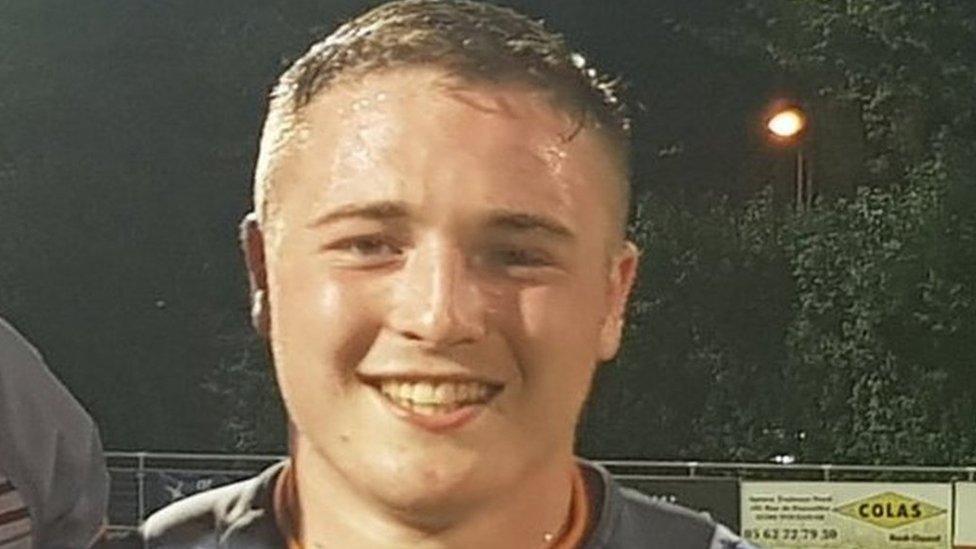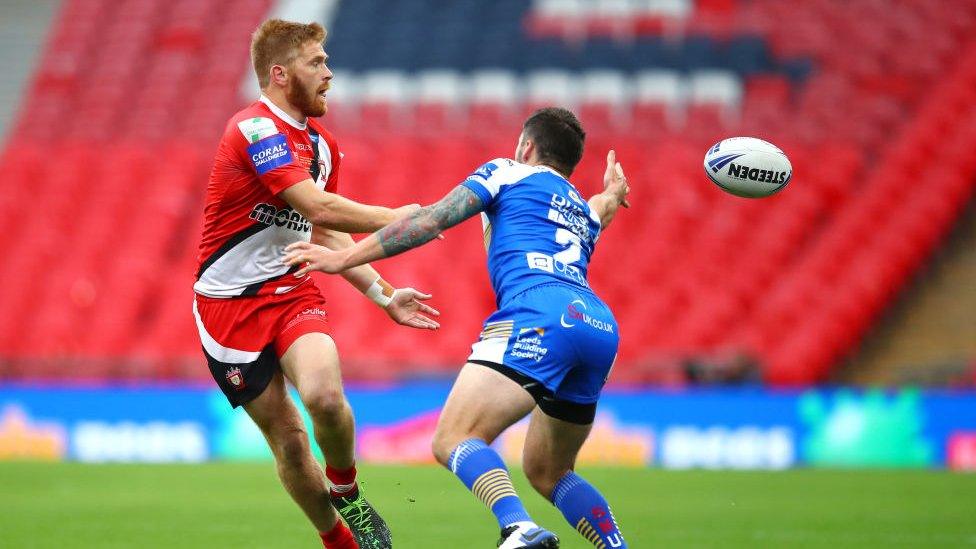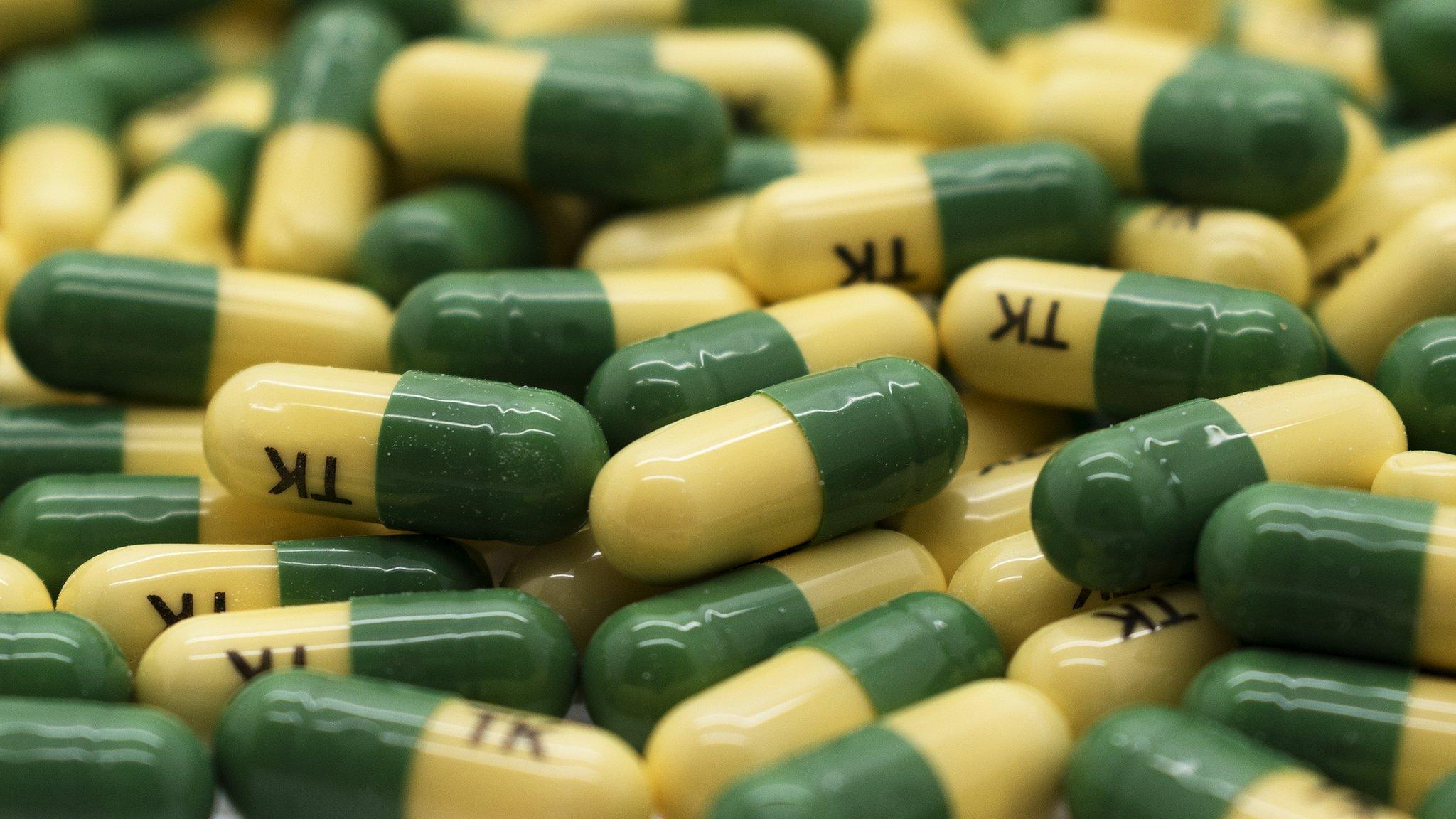Tramadol: Rugby League's fight to kick 'dirty drug'
- Published

Tramadol was the "go-to" drug in rugby league, the BBC has been told
Following an inquest into the death of young rugby league player Archie Bruce, the BBC has been told a powerful prescription-only painkiller involved in his death was the "go-to" drug for many players.
As a new Super League season gets ready to kick off, the BBC has been finding out just how deeply Tramadol had become part of the game around the time of the 20-year-old athlete's death in 2019.
Archie Bruce had the world at his feet, having just achieved one of his dreams by making his debut for Batley Bulldogs.
Archie, who played as a hooker, had come off the bench to feature in his first semi-pro game and was on his way to earn a contract that could propel him into the professional game he so loved.
"He would have been signed," Batley chairman Kevin Nicholas told the inquest into Archie's death.
Alistair Leak, a teammate of Archie's at Batley, had also spotted his potential.
"I am sure Archie would have gone on to play at a higher level," he told the coroner.
After the fixture away to French side Toulouse in August 2019, Archie, from Dewsbury, celebrated with teammates on a night out.
They returned to the hotel at 05:00.
It was the last time he was seen alive.

Archie Bruce, 20, died hours after he made his debut for Batley Bulldogs against Toulouse
The inquest into Archie's death heard he died after taking more than twice the "toxic" level of Tramadol.
Ahead of the 2024 season, rugby league's governing body clamped down and banned the medication.
But, speaking to players, officials and experts, the BBC has discovered just how ingrained use of the "dirty drug" had previously become.
"Tramadol was very common," a healthcare professional who has worked at all levels of the game, from academy to Super League, said.
The expert, who asked to be anonymous to avoid repercussions, said the drug was often used in conjunction with sleeping pills by players.
"It's a really dirty drug," he added.
Tramadol, which was created in the 1970s, became more widely available in the UK from the 1990s.
The drug is used to treat "moderate to severe pain", according to Laura Wilson, from the Royal Pharmaceutical Society.
She said the medication was believed to mimic opiate-based treatments like morphine, but without some of the negative side effects.
"It was felt as if it had a reduced risk of addiction and dependence than other opiates.
"As we have subsequently found out, that's not been the case."
'Tramadol went underground'
By 2014, there had been a spike in deaths associated with Tramadol - 240 according to ONS data, external - and its use was tightened up.
The law change meant it was harder for players to be prescribed the drug through their club doctor.
"That was when it went a bit more underground," recalled the healthcare professional.
Despite the effort to more tightly regulate the medicine, it refused to go away in locker rooms up and down the country.
"Some of the lads at rugby have Tramadol and give them out and charge people for them," the inquest heard from one former teammate of Archie's.
It was more popular among "old-school" players, the healthcare expert said, with one current player, aged 29, telling the BBC he had never come across it in his 10-year career.
However, Kris Welham, a veteran of almost 20 years in rugby league, said talk used to frequently turn to the substance.
"People would say after a game or after an injury 'I'm sore, I'll have a few Tramadol tonight with a beer, just to take the pain away'," he said.
"Probably 90% of players have a beer after a game, win or lose. It's just the culture.
"For people taking pain relief Tramadol was the go-to."

Kris Welham said Tramadol was the 'go-to' drug for pain relief
The inquest into Archie's death heard a similar story, with the drug being taken to ease the pain picked up playing the ultra-physical sport - against the knowledge of the club's management.
But the court also heard how some players would swallow the pills "because they like the feeling of being at ease and it increases the effects of alcohol".
The anonymous healthcare expert said some people had become addicted and just took the pills to "feel normal".
"There was a bit of a culture of 'ooh let's get on the Tramadol'," he said.
Ms Wilson said the drug provided users with feelings of "wellbeing and relaxation", but when taken recreationally it could "induce those effects of similar drugs like morphine or heroin".
Like those drugs, tramadol had "significant addiction risks".
"People do become dependent on it even when they are using it as prescribed," Ms Wilson said.
But what about when it wasn't prescribed? Were players sticking to the medical guidelines?
Doses that could kill
The healthcare professional said "ridiculous doses" had been swallowed by those hooked on the drug.
How strong? Strong enough to kill anyone who had not built up a tolerance level, he warned.
Senior coroner Martin Fleming, who recorded a verdict of accidental death at the inquest held in Bradford, said Archie was "naïve" towards drug-taking amid the "euphoria" of his debut.
In a statement read out to the inquest, Archie's family described him as "impressionable, vulnerable and wanting to fit in".
In September 2022, the World Anti-Doping Agency (WADA) announced tramadol would be included on its 2024 list of prohibited substances and methods, with UK Anti-Doping (UKAD) and the RFL following suit.
WADA said the early announcement "was made to allow all stakeholders in sport to prepare for this change".
According to the healthcare professional, it would also give addicted athletes time to "get clean".
"It was definitely more rife at semi-pro level," he said.
"The lower down you go, the less professional it is and they have got less to lose."
But, he said, use of Tramadol was not a problem unique to rugby league.
Former rugby union and football players have also spoken of their problems with the drug.
Rugby Players Association general secretary Christian Day, who is a member of the UK Anti-Doping (UKAD) Athlete Commission, told the BBC Tramadol's use for performance-enhancing purposes first came to light in cycling, with a ban on in-competition use brought in in 2019.
The former rugby union professional added: "As someone who played professional rugby for 17 years it was really common.
"If you were really sore, if you had a bad injury, invariably Tramadol would be involved."

Tramadol was also common in rugby union, former player Christian Day told the BBC
Mr Day added: "It's addictive and players who have loaded up on it over the years can develop a habit they need to fulfil, or they find it incredibly hard to stop.
"In the early years of my career Tramadol was to go-to drug for pain relief."
At the inquest, Archie's family called for a "robust code of conduct with enhanced safeguarding" in rugby league and the coroner did not rule out issuing a prevention of future deaths report calling for action.
In response, the RFL spokesperson said the organisation had made changes to its code of conduct for players and clubs when overseas and to its player welfare policy since Archie's "tragic death".
They added that WADA's Monitoring Program had uncovered evidence of "significant use and possible abuse" of Tramadol "in a number of sports".
They said the drug had been banned in-competition from 1 January when the 2024 WADA Prohibited List came into effect.
Mr Day, who now advises UKAD on anti-doping from an athlete's perspective, said: "Rugby league is one of the toughest sports on the planet.
"It doesn't surprise me that a player would need to use pain relief [and] if we don't address the needs of athletes, you can potentially end up taking things you shouldn't.
"But I do hope it's more of a problem of the past."

Follow BBC Yorkshire on Facebook, external, X (formerly Twitter), external and Instagram, external. Send your story ideas to yorkslincs.news@bbc.co.uk, external.
- Published17 January 2024

- Published19 November 2019

- Attribution
- Published16 January 2019
